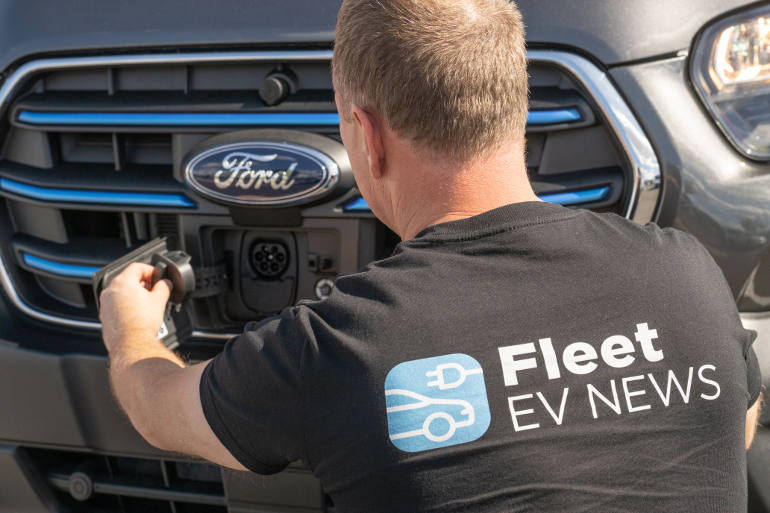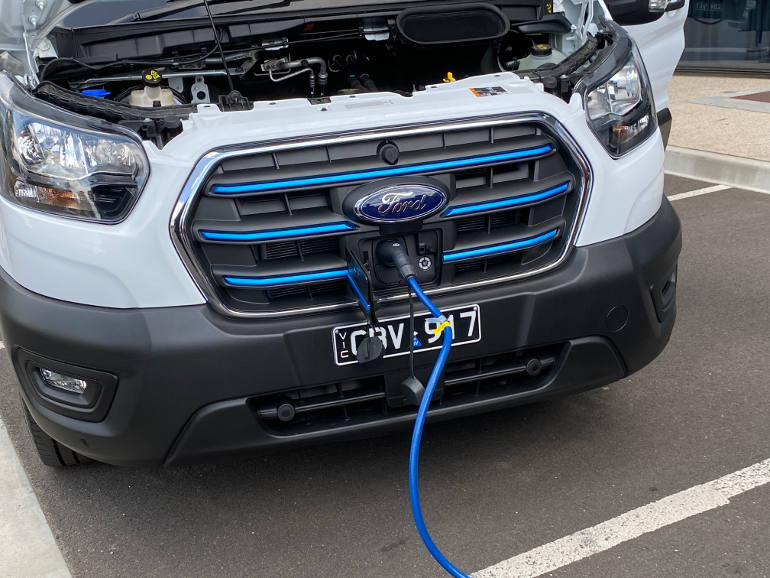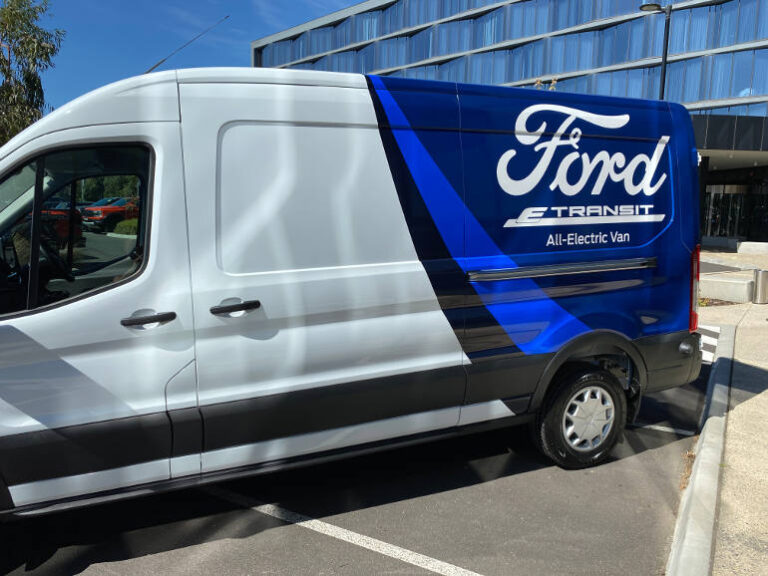Ford Australia’s first fully electric vehicle has arrived in Australia, the new Ford E-Transit.
The new all-electric E-Transit is the same Ford Transit Australians know and trust to get the job done but with the added benefit of zero tailpipe emissions, reduced noise and lower operating and maintenance costs for business operators.
Two E-Transit models will be available for customers, the long-wheelbase 420L BEV Mid Roof and 420L BEV High Roof, with deliveries expected to start in the coming weeks.
Both E-Transits are powered by an electric motor delivering an impressive 198 kW 1 of power and 430 Nm 1 of torque, the highest power and torque outputs of the Transit range.
The electric motor is powered by a 68-kWh lithium-ion battery pack. The battery is located beneath the load floor in a sealed structure with side-impact protection as standard.
The EV motor is paired with a single-speed automatic transmission that sends power to the rear wheels of the van.
| E-Transit | 68 kWh Electric Motor |
| Max. Power 1 | 198 kW1 |
| Max. Torque1 | 430 Nm1 |
| Transmission | 1-Speed Automatic |
Pricing
The Ford E-Transit is priced from $104,990 (MLP), and can be purchased exclusively through an Authorised Ford EV Dealer. A more spacious ‘high-roof’ body can be optioned for $1,500.
The E-Transit has 12 month / 30,000 km service intervals (whichever comes first).
Driving Range
With a maximum driving range of more than 2.5 times the average distance a commercial van16 travels each day – E-Transit means commercial customers can take care of business, and reduce fuel costs.
The 68-kWh battery is designed to provide ample energy to power the E-Transit with sufficient range to meet the daily requirements of businesses operating in urban environments. It also has the additional capacity to account for variations in vehicle load and weather conditions.
As with all electric vehicles, actual driving range varies with conditions such as external elements – including temperature, driving behaviours, route profile, vehicle maintenance, and lithium-ion battery age and condition.
| Driving Range | 420L BEV LWB RWD – Mid Roof | 420L BEV LWB RWD – High Roof |
| Worldwide Harmonised Light Vehicle Test Procedure (WLTP) Overall Range (Kilometres)2 | 230-307 | 222-295 |
Charging
A grille-mounted charge socket makes charging easy and E-Transit comes equipped with a Mode 3, 32-amp Charge Cable as standard.
Flexible charging options allow customers to either AC charge overnight in approximately 8 hours3 or quick DC Charge Top Up (15 per cent to 80 per cent at 115 kW) in approximately 34 minutes3, giving commercial customers the confidence to complete day-to-day operations.
| Charging Summary | 68 kWh Electric Motor |
| On-Board Charger (AC) | 11.3 kW |
| Fast Charging Capacity (DC) | 115 kW |
| Charging Cable | Mode 3 (Type 2, 32A) |
| AC Charging Time (3 Phase At 11 kW) 0-100%3 | 8.2 hours |
| DC Fast Charging Time (At 115 kW) 15-80%3 | 34 minutes |
E-Transit also features regenerative braking, generating energy from electricity ordinarily lost with coasting or light braking. The recovered energy is then stored in the traction battery to maximise range.
This lift-off regeneration is always active but optimised in ‘Low’ mode accessed via the rotary e-shifter.
Drive Modes
E-Transit’s three drive modes are tailored to its electric powertrain, and are available via the 12’’ SYNC 44 Touchscreen or via a dedicated button on the centre console:
- Eco Mode: is tuned to maximise driving range and aims to improve energy use by between 8 and 10 per cent if E-Transit is driven unladen, or at highway speeds, by limiting the maximum speed, regulating acceleration, and optimising climate control.
- Normal Mode: is the default drive mode for the vehicle and is tuned for everyday driving, balance, and comfort.
- Slippery Mode: improves vehicle traction in low-grip road conditions.

Independent Rear Suspension
The rear suspension of the E-Transit has been re-designed to maximise carrying capacity and improve performance.
Specifically, E-Transit features an extremely compact heavy-duty semi-trailing arm suspension system that enables better steering precision and more confident handling, plus better traction in both laden and unladen conditions.
The compact nature of the suspension also allows for an uncompromised cargo capacity of up to a maximum load space of 11 cubic metres5 in mid-roof specification and 12.4 cubic metres5 for the high-roof version, both of which are identical to the Transit 350L RWD diesel equivalents. Gross vehicle mass of up to 4.25 tonnes is offered, with a payload 7 of up to 1,611kg on the mid roof van and 1,566 kg for the high roof van.
Tested To Extremes
Ford engineers put the E-Transit through a ‘boot camp’ for vehicles during an exhaustive test regime for customers operating in the most arduous situations.
During the tests, the all-electric E-Transit took on challenging winter driving conditions in Michigan, US; simulated extreme heat, cold and altitude in Ford’s Environmental Test Chamber in Cologne, Germany; and the giant potholes and rough road surfaces at the company’s Lommel Proving Ground in Belgium.
Ford punished the E-Transit through a rigorous series of tests to ensure durability. The no-compromises approach recreates the effects of more than 240,000 kilometres of driving – or a decade of hard work – for the average customer.
Ford’s Environmental Test Chamber created conditions from the Sahara to Siberia. Engineers refined the all-electric powertrain and cabin environment for performance and efficiency by subjecting E-Transit to more than 40 degrees Celsius for two weeks using 28 spotlights with 4,000-watt bulbs. E-Transit’s battery pack features liquid-cooling technology for optimum performance in extreme weather.
The van also had to prove it could function at -35 degrees Celsius and with a full load making the punishing climb to 2,500 metres, as high as Austria’s Grossglockner High Alpine Road, one of the highest paved roads in Europe.
Thousands of passes over dedicated tracks of bumps, potholes and cobbles were performed at Ford’s Lommel facility, simulating cobbled streets, rough back roads and challenging un-made tracks from around the world.
Durability of the E-Transit’s battery pack, electric motor and unique rear suspension were tested by repeatedly driving the new model through mud and salt baths and through saltwater sprays, simulating winter roads and fords as well as testing the components’ corrosion resistance. The electric motor’s reliability was proven by running it continuously for 125 consecutive days.
Cargo Capacity and Weights
Cargo capacity is essential for all Transit customers and E-Transit’s vehicle architecture has been designed with that in mind.
By locating the vehicle battery under the load floor, the E-Transit engineering team ensured the cargo volume was uncompromised, matching the load space of the diesel equivalent, the Transit 350L.
Capacity offered is a maximum load space of 11 cubic metres5 on the mid-roof and 12.4 cubic metres6 on the highroof with a payload of 1,611 kg7 for the 420L BEV mid-roof and 1,566 kg7 for the 420L BEV high roof model.
Because the load area on the EV-Transit is largely the same as conventionally powered Transits, many load area conversions will carry over to E-Transit with minimal modifications, making it easy to adopt an E-Transit into a business fleet.
Also, with the battery pack located where it is, this gives E-Transit a low centre of gravity. Combined with its rear-wheel drive and compact coil sprung rear suspension, E-Transit has excellent traction and stability in both laden and unladen conditions. This is consistent with the passenger car-like driveability that Transit is known for.
| 420L BEV LWB RWD | 420L BEV LWB RWD – High Roof | |
| Load Space Maximum (cubic metres)5 Single Side Load Door (with Bulkhead)6 | 11m3 | 12.4m3 |
| Gross Vehicle Mass (GVM) – kg | 4250 | 4250 |
| Maximum Payload7 – kg | 1611 | 1566 |
| Kerb Weight8 – kg | 2639 | 2684 |
Technology
The entire Transit range features Ford’s SYNC 44 system and E-Transit is no exception. With twice the computing speed of SYNC 34, enhanced voice control and delivered via an intuitive 12-inch wipe-clean, glare-resistant touchscreen, E-Transit’s SYNC 44 system also includes:
- Wireless Smartphone Integration: connects to Apple CarPlay™®9 and Android Auto™®9 without a USB cable.
- Connected Built-In Satellite Navigation10: provides the most efficient route, live updates on traffic and parking, available charging points (that can be filtered by charging efficiency), and even the latest weather updates.
- Scheduled Pre-Conditioning (heating and cooling): is designed to help maximise run time when vehicles are charging, allowing drivers to bring the vehicle cabin to a desired temperature while still plugged in, helping preserve battery charge for use on the road. This capability is available via the ‘Departure and Comfort’ selection accessed through the ‘Features’ menu in the SYNC 44 screen.
- Digital Owner’s Manual: allowing customers to search for vehicle information on demand using the touchscreen.
Connected Services
FordPass11 is the ultimate partner for E-Transit drivers, giving customers access to Remote Start and Remote Unlock from their mobile phone, as well as key Electric Vehicle (EV) connected services and charging information including:
- FordPass Power My Trip12: which works with Connected Built-In Satellite Navigation10 to help customers plan trips that include convenient charging stations along their route:
- By entering their destination directly into SYNC 49 or via the FordPass11 App, ‘Power My Trip12 can consider E-Transit’s current state of charge in addition to real-time traffic conditions to help identify charging stops when a customer will need them.
- The feature includes estimates of the amount of time spent at each charging station and can also suggest different routes based on driver preferences such as: time taken, distance travelled, or optimal economy.
- Battery Charge Level
- Distance to Empty (km)
- Nearby Chargers
- Charge Settings: allowing customers to set up preferred Charge Times and add Departure Times.
- Charge Logs
Active Safety and Driver Assistance
E-Transit features the same high level of active safety and driver assistance13 available on the entire Transit van range, including:
- Autonomous Emergency Braking (AEB) with Pedestrian Detection
- Adaptive Cruise Control14
- Blind Spot Monitoring System
- Blind Spot Assist
- Hill Launch Assist
- Intersection Assist15
- Lane Keeping Aid with Lane Departure Warning
- Traffic Sign Recognition
- Rear Camera
- Rear Parking Sensors
- Auto Hold (E-Transit only)
Warranty
As a base vehicle, E-Transit will be covered by Ford’s five-year, unlimited kilometre Express New Vehicle Warranty which sits alongside the eight-year or 160,000 km (whichever occurs first) warranty package for the battery and high-voltage electric components.
More information about E-Transit is available at https://www.ford.com.au/future-vehicle/e-transit/
E-Transit forms an important part of Ford Australia’s electrification plans, with a plan to bring at least five electrified vehicles down under by the end of 2024.

Disclaimers:
- Calculated via peak performance of the electric motor(s) at peak battery power. Individual results may vary.
- Based on full charge of E-Transit Van 420 GVM. Estimated range using Worldwide Harmonised Light Vehicle Test Procedure (WLTP). Figures shown are for comparability purposes and should only be compared with other vehicles tested to the same technical procedures. Actual range varies with conditions such as external elements like temperature, driving behaviours, route profile, load, vehicle maintenance, and lithium-ion battery age and condition. WLTP Overall Range reflects a combined driving cycle this test is conducted in controlled conditions with an ambient temperature of 23 degrees Celsius and no climate or electrical load.
- Indicative charging performance for E-Transit Van 420 GVM. Charge power can decrease with increasing state of charge. Actual charge times and charge speeds can vary based on different factors (e.g. weather, temperature, driving behaviour, route profile, vehicle condition, age and condition of the lithium-ion-battery and used charging infrastructure).
- Don’t drive while distracted. Use voice-operated systems when possible; don’t use handheld devices while driving. Some features may be locked out while the vehicle is in gear. Not all SYNC® 4 features are compatible with all phones.
- Maximum load volume method simply measures the volume of a fine-grained material such as sand or rice which can be deposited into the loadspace.
- Load Area Protection Kit may impact cargo area dimensions and capacities.
- Subject to State and Territory regulations. Payload is defined as the Gross Vehicle Mass minus the kerb weight. Payload is the maximum combined value of occupants, cargo, added options and added structures. GVM must not be exceeded.
- Kerb Weight is the weight of a standard-specification vehicle, including fluids, without occupants, luggage, or cargo and with all standard equipment. Additional weight of optional features must be taken into account when calculating kerb weight.
- Apple CarPlay™ / Android Auto™ requires phone with compatible version of Apple iOS / Android™ (as applicable) and active data service. SYNC® does not control Apple CarPlay / Android Auto while in use. Apple / Google and other third parties are responsible for their respective functionality. Message and data rates may apply. Apple CarPlay, Siri Eyes Free, iPod and iPhone are trademarks of Apple Inc. registered in the US and other countries. Android Auto and Google Maps are trademarks of Google Inc.
- Connected Built-In Satellite Navigation is a Connected Service where eligible vehicles receive 1 year of service from the Ford Express New Vehicle Warranty start date, after which time the service may cease to be available or may be subject to a subscription fee. Users must have created a FordPass App account (terms apply), have fully activated the vehicle’s FordPass Connect modem and have SYNC Location set to ‘on’ to use this feature.
- Use of FordPass is subject to the FordPass Terms and Privacy Policy available on ford.com.au/fordpass and requires a compatible mobile device, internet access and software (including software updates from time to time). FordPass functionality and appearance may change over time due to software updates. You are responsible for internet access, mobile network data and voice call services required for your use of the FordPass App on your mobile device, including associated fees. The FordPass App and FordPass Connect modem can only work when both are connected to the telecommunications network. The FordPass Connect modem will only function on the 3G or 4G telecommunications networks. When these networks are no longer available, the modem will stop functioning and the connected services and all data transmission via the modem will cease. Ford cannot guarantee that FordPass will be in fully operating condition at all times and the FordPass App may be unavailable or particular FordPass services interrupted. Ford is not responsible for any limitations or restrictions of the telecommunications network or of your mobile device. Warning: Local laws prohibit some phone functions while driving. Check your local road rules before using these functions. Use Remote Vehicle Start and Stop responsibly and only in well ventilated areas where you are aware of your vehicle’s surroundings.
- FordPass Power My Trip is a Connected Service that requires the Connected Built-in Satellite Navigation service to be switched ‘on’. Eligible vehicles receive 1 year of service from the Ford Express New Vehicle Warranty start date, after which time the service may cease to be available or may be subject to a subscription fee. Users must have created a FordPass App account (terms apply), have fully activated the vehicle’s FordPass Connect modem and have both the SYNC Location and ‘Share Vehicle Data’ set to ‘on’ to use this feature.
- Driver-assist features are supplemental and do not replace the driver’s attention, judgment and need to control the vehicle. May not operate in some driving and road conditions (including at certain speeds) or adverse weather.
- Adaptive Cruise Control has a minimum operating speed of 30km/hr.
- Intersection Assist does not detect all vehicles in intersection, pedestrians or cyclists. It does not replace safe driving. See Owner’s Manual for Limitations
- Ford Australia EV Research 2021, YouGov. Total sample size was 1,045 adults (aged 18+). Fieldwork was undertaken between 16 September 2021 – 19 September 2021. The survey was carried out online.
- Regular Production Options are available at additional cost.






